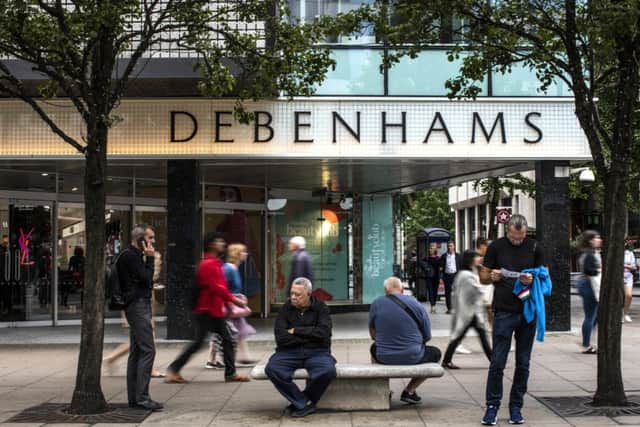Struggle of John Lewis a sign of changing times in retail - Jayne Dowle


The start of January has brought chaos to the business, which revealed a two per cent like-for-like sales slump in the seven weeks to January 5, purportedly its busiest time of year.
The managing director, Paula Nickolds, has been summarily sacked and staff warned that trading conditions are of such concern they may miss out on their annual bonus. Excitable Edgar, the dragon which featured in the retailer’s Christmas advert, clearly wasn’t excitable enough to warm up trading conditions significantly.
Advertisement
Hide AdAdvertisement
Hide Ad

John Lewis has long been regarded as a solid and sensible retail haven, where goods were famously never knowingly undersold – meaning that prices were comprehensively checked to ensure that they were competitive with other retailers – and where staff were ‘partners’ who jointly owned the company, which has 51 outlets across the UK, including three department stores in Yorkshire.
This staid reputation is part of the problem. John Lewis was always renowned for service and reliability, not the most engaging of messages to transmit to savvy new generations of shoppers. My teenagers, to my knowledge, have never crossed the threshold.
Yet back when I was young, in the 1990s, the flagship Oxford Street branch was our first stop for bedding, towels, fridges and pans. Their wedding list service was a rite of passage; many a couple started out furnishing their first home via this department. How quaint that sounds today.
Advertisement
Hide AdAdvertisement
Hide AdJohn Lewis is not alone. In common with other big-name department stores such as Debenhams, it has struggled to keep pace with the retail revolution. In total, 19 Debenhams stores are to cease trading in coming months. Their demise is joined by the collapse of Mothercare, House of Fraser closing more stores this year and job cuts at HMV and the discount fashion chain Bon Marché. And then there’s Marks & Spencer, which has reported a ‘disappointing’ Christmas trading period. Although food revenue grew by 1.5 per cent in the three months to the end of December, sales in the clothing and home division fell by almost three per cent.


It’s perhaps a sign of this jittery climate that Ms Nickolds, who has been with the company since 1994, had only been in the post for three months and was set to take joint helm of John Lewis’ sister company, food retailer, Waitrose, whose previous boss only departed a few months ago.
If you’ve never shopped at John Lewis – the Yorkshire branches are in Leeds, York and Sheffield – you might be wondering what all the fuss is about. Whilst retail experts fulminate and those who take an abiding interest in the future of the high street spend time trying to come up with explanations and suggestions, whole generations are growing up with no innate connection, and therefore no loyalty to, these once iconic brands.
Talk to a young couple these days and if they have a wedding list at all, it’s likely to be online, at Amazon. Or more likely, they won’t be bothering with their bottom drawer at all in favour of hard cash or vouchers for a honeymoon. Boardroom shuffles may grab the headlines, but what they fail to take into account is the revolution in consumer habits which has been taking place under their noses.
Advertisement
Hide AdAdvertisement
Hide AdThe truth is the world has changed and big brand retailers are losing their footing in the new shaky terrain.
All this bad news doesn’t equal the death of the high street or irreversible decline in town centres. Stores must streamline, reduce their footprint and therefore running costs, and ensure that their online presence and bricks and mortar stores enjoy a symbiotic relationship.
Equally significantly, it means that former shopping destinations must evolve and offer a wide range of intuitive things; food, drink, leisure, flexible office accommodation, even housing for sale or long-term rental.
This can be managed; indeed, it’s already happening in my own town of Barnsley, where council leaders wisely eschewed chasing a big department store as a flagship for the new £180m Glassworks development in favour of cafes, restaurants and street food traders, which is proving a huge success.
Advertisement
Hide AdAdvertisement
Hide AdHowever, this cannot be attempted nationwide without serious commitment and understanding of the bigger picture from local and national government, which must consider freeing up planning laws, addressing business rates and genuinely committing to supporting evolution.
Our retailers deserve better from the government and so do we, the customers-turned-consumers who will keep the heart of the high street beating.